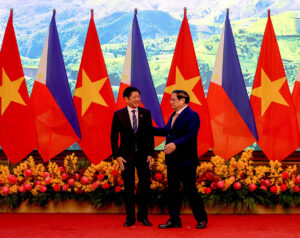
Vietnam, our strategic partner
On Jan. 29 to 30, President Ferdinand Marcos, Jr. went on a state visit to Vietnam upon the invitation of Vietnamese President Vo Van Thuong. Vietnam is a strategic partner to the Philippines — the only ASEAN country with which we enjoy this diplomatic relationship.
The two leaders’ meeting resulted in a joint statement with the following highlights: an acknowledgment of the importance of strong security and defense cooperation, the need to strengthen existing maritime cooperation mechanisms, and the importance of maintaining peace, stability, maritime security, safety, and freedom of navigation in and overflight above the South China Sea.
On the first point, the leaders agreed to: 1.) continue high-level visits, information sharing, education and training exchanges, and defense dialogue mechanisms; 2.) further enhance collaboration on defense industry, as well as cooperation on military medicine, search and rescue, humanitarian assistance and disaster relief (HADR) operations, maritime and aviation security, counter-terrorism, cybersecurity, peacekeeping operations, among others; 3.) intensify law enforcement cooperation against transnational crimes, including those related to migrant smuggling, human trafficking, gambling, underground and illegal credit facilities, illegal residence and labor as well as other traditional and non-traditional security concerns, and called on concerned officials to build on each other’s expertise and experience.
With regard to existing maritime cooperation mechanisms, the two leaders vowed to strengthen the Joint Commission on Maritime and Ocean Affairs at the Deputy-Minister level, the hotline communication mechanism between coast guard authorities of both countries, among others, and to adopt other measures to ensure the safety and security of fishermen from both countries as well as to solve amicably the unexpected incidents at sea.
It is maritime cooperation, according to Mr. Marcos, that is the foundation of the two countries’ strategic partnership. Thus, it is critical for both countries to work together in various areas of cooperation such as defense, trade, agriculture, and culture, among others.
Under maritime cooperation, the two heads of state witnessed the signing of two memoranda of agreement. First was the MOU on Incident and Management in the South China Sea, which seeks to promote mutual trust and confidence between the two countries in common issues and interests in the maritime domain. Included here are the resolution of territorial or jurisdictional disputes by peaceful means, through consultation and negotiation in accordance with international law.
There was also the Memorandum of Understanding on Maritime Cooperation. This establishes a hotline between the Philippine Coast Guard and the Vietnamese Coast Guard. The hotline is intended to enhance communication and adopt measures to ensure the safety and security of fishermen from both countries. It could also help amicably resolve any incidents that may arise.
Finally, the two leaders emphasized the importance of exercising self-restraint in the conduct of activities that might complicate or escalate disputes, and in the process affect regional peace and stability.
They also highlighted the need to avoid unilateral acts that can change the status quo and increase tensions. They underscored the importance of the peaceful settlement of disputes without resorting to the threat or use of force in accordance with international law, particularly the 1982 United Nations Convention on the Law of Sea (UNCLOS).
They reaffirmed their commitment to ensuring the full and effective implementation of the 2002 ASEAN-China Declaration on the Conduct of Parties in the South China Sea (DOC) in its entirety and working towards the early conclusion of an effective and substantive Code of Conduct in the South China Sea (COC) that is in accordance with international law, particularly the 1982 UNCLOS. In this regard, they urged promoting an environment conducive to the COC negotiations.
This state visit, the statement, agreements, and resulting activities illustrate the Philippines’ pursuit of opportunities for collaboration with like-minded partners, specifically in the maritime domain. Vietnam is an especially valuable strategic partner: like the Philippines, it is a maritime country, and they are separated by the South China Sea. Thus, the two countries’ cooperation in maritime security and marine resource conservation is crucial to ensuring a secure, stable, and prosperous region.
Demonstrating this is the Philippine Coast Guard’s invitation to the Vietnamese Coast Guard to join, for the first time, the trilateral marine pollution exercise (Marpolex) in June. The Indonesian and Japanese Coast Guards will participate in this exercise that will be held in Bacolod in June.
Such an effort on the part of the Philippines is aligned with its stature as a rising middle power that is facing asymmetric challenges on many fronts.
The strategic partnership between Vietnam and the Philippines represents a powerful commitment to a rules-based international order and a shared understanding of the value of norms in the international community. Filipinos count themselves fortunate to be in a partnership with Vietnam and look forward to the days ahead, confident that whatever challenges may arise, we have a steadfast partner with which we stand side by side.
Victor Andres “Dindo” C. Manhit is the president of the Stratbase ADR Institute.



